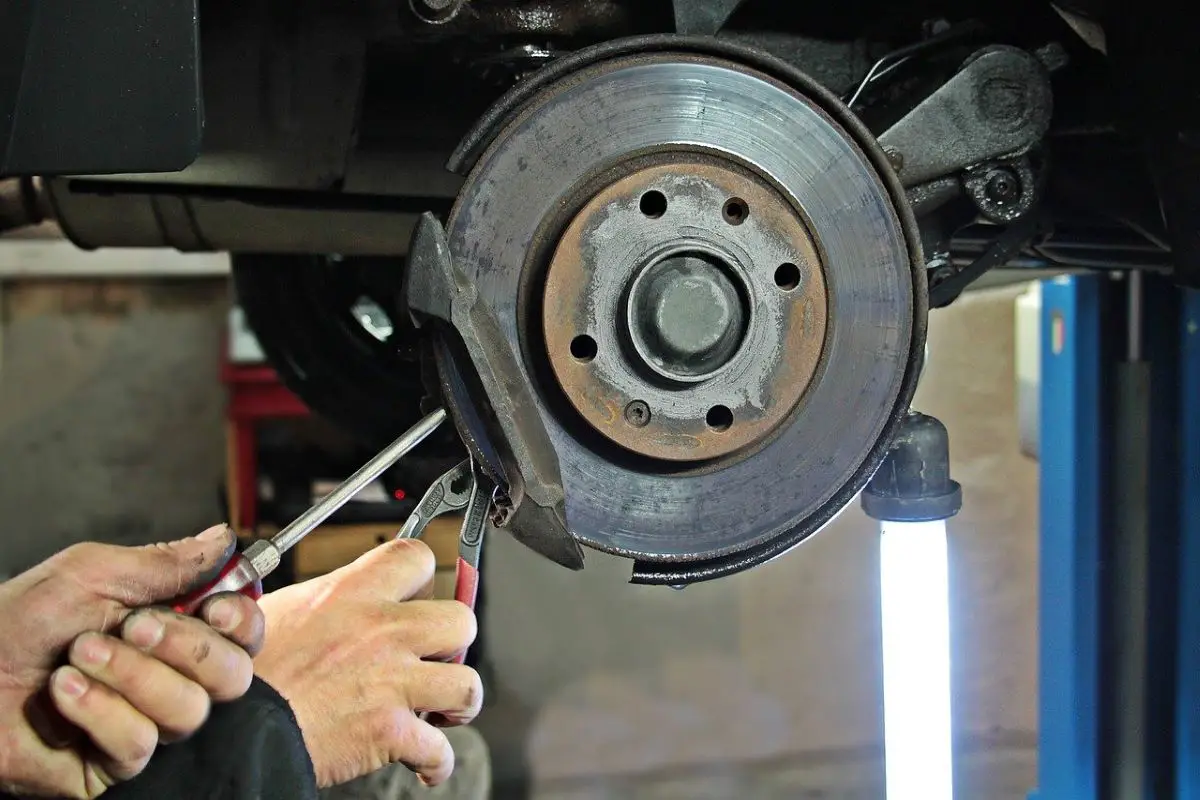You may be driving, and as you step on the brake, you may hear some shrieking, grinding sound. That may be your brake pad wearing out. Perhaps you may be asking yourself, how long do brake pads last?
In general, brake pads usually last between 30,000 to 70,000 miles (48,000 to 112,000KM). There are brake pads that can last up to 100,000 miles (161,000KM). How long your brake pad lasts may depend on your use, the materials used on the brake pad, and the braking systems your vehicle uses.
In this post, we explore and see how long brake pads last. We also take a look at what brake pads really are, as well as the types of brake pads available. We also discuss how much it will cost to change your brake pads.
What Are Brake Pads?
Brake pads are the paddings that help to apply friction to slow down rotating wheels. Brake pads usually work in pairs, which means you need two brake pads per wheel. The material on the brake pads wears out slowly as you use it, which means you need to change it every now and then.
Brake pads are basically a part of the braking system for vehicles. It commonly has the physical appearance of a kidney but is flat.
It comprises two parts, a steel backing plate and a treated surface, with friction materials applied to the surface. This is the surface that faces the disc brake rotors and takes the brunt of the braking work.
As you apply force onto the brake pedal, your car’s braking system pushes hydraulic fluid into the brakes, causing the caliper to clamp in. When the caliper clamps in, it pushes the brake pads against the disk brake rotors. The disc brake rotors are connected to the wheels and rotate together with it.
As a result, the brake pad causes friction and slows down the rotation of the disk brake rotor. This also slows down the rotation of the wheel. The wheel eventually stops rotating, and your vehicle comes to a complete stop.
If you apply hard pressure on the brake pedal, more hydraulic fluid will be sent to your brake caliper. And the harder the brake pad will clamp up on your disc brake rotor. This will result in harder breaking.
In disk brakes, you usually have two brake pads for each wheel. Each brake pad will clamp down on the opposing side of the disk brake rotor. As you apply more and more friction on the brake pads, the friction materials on the pad wear out slowly.
This means brake pads are actually consumables that you need to replace every now and then.
What Are The Types Of Brake Pads?
There are several types of brake pads, each providing different performance for different driving needs. The difference usually lies in the treated surface that gets into contact with the disc brake rotor.
Some are made to be cheaper but may wear out faster. Some may be may last longer but are loud and noisy. The best brake pads are quiet, comfortable, and last long, but they are also the most expensive.
Organic Brake Pads
Organic brake pads are made of various materials, including rubber, carbon, fiberglass, cellulose, aramid, and Kevlar. These materials are then bound together with resin and applied to the brake pad’s friction side.
Organic brake pads are among the least expensive pads available. They are notable for their non-metallic composition, which makes them relatively quiet and less abrasive on the rotors of the brakes. They are also known for their low price.
However, organic brake pads are the least resistant to wear and tear, so they wear out quickly. Organic brake pads may suit daily drivers who do not push their cars too hard or require strong braking.
You may like this article: Why Is My Blinker Blinking Fast?
Semi-Metallic
A semi-metallic brake pad comprises a combination of metal fibers, resins, and fillers like graphite, all of which are mixed together and then applied to the brake pad’s friction surface.
The interesting thing about semi-metallic brake pads is that they may come in different mixes and formulations. Usually, brake pad makers will come up with a formulation based on what the brake pad may be used for.
For example, a heavy truck may need stronger braking power, which means the mixture may be heavier towards the metallic side. A regular passenger car may have fewer metallic parts and more organic materials for a softer, more comfortable braking experience.
Metallic elements are usually added to brake pads to leverage their ability to absorb heat. This means the metallic elements may take on the heat, protecting the organic compounds from wearing out too soon. Semi-metallic brake pads also may last longer than organic pads.
However, they are also more expensive compared to organic pads and noisier. The braking experience is also less comfortable than organic brake pads.
Metallic
Metallic brake pads, such as in race cars, are usually used on performance cars. Most metallic brake pads consist of sintered steel without organic or synthetic additives.
This is because race cars demand a lot from the brakes. As such, the brakes may overheat and wear down too quickly if there is organic content. Plus, race cars put performance first and comfort last. This means no organic compounds are needed on the brake pads.
As a result, you get hyper-performing brake pads that last very long but are loud and uncomfortable.
Ceramic
Ceramic brake pads may be a nice balance between the durability of the metal pads and the grip and fade resistance of the organic brake pads. They are composed of clay and porcelain that have been bound to copper flakes and filaments.
Ceramic brake pads usually do not typically dissipate heat as efficiently as the other three types, despite the presence of copper, known for its high thermal conductivity). This means ceramic brake pads may warp or become out of shape easier.
However, ceramic brake pads are well appreciated for being quiet and more comfortable. Comfort-based luxury cars tend to use ceramic brake pads.
How Long Do Brake Pads Last?
Brake pads may last between 30,000 to 70,000 miles (48,000 to 112,000KM), with some higher quality pads able to last up to 100,000 miles (161,000KM). Your driving style, brake pad materials, and car’s braking systems may affect how long your brake pad lasts.
Brake pads are the part of your vehicle’s braking system that actually applies friction to your disc brake rotor to slow down your car wheels. As such, it may eventually wear out and need to be replaced.
Generally, many automakers suggest that you should have your brake pads checked starting at 30,000 miles (48,000 KM). You should aim to replace them sometime between 30,000 to 70,000 miles (48,000 to 112,000KM).
However, how fast your brake pad wears out may depend on several factors:
Driving Style
In general, if you drive more aggressively with a lot of hard braking at high speed, you are likely to wear out your brake pads faster. This is because your brake pads must apply a lot of friction to your disc brake rotor during hard braking.
As a result, your brake pad may get hot faster, meaning more materials on your brake pad may deteriorate and disintegrate, becoming brake dust. You may help to prolong your brake pad’s life by driving a little less aggressively and applying brakes softer.
Brake Pad Types
If you use primarily organic brake pads, you will likely see your brake pads wearing out faster. This is because organic materials cannot withstand high heat as well as metallic brake pads during braking and may disintegrate faster.
You may consider using semi-metallic or ceramic brake pads for your regular passenger car to help your brake pads last longer. These brake pads are more heat resistant, which means they may not wear out too fast or produce too much brake dust.
Braking Systems On Your Vehicle
Some vehicle braking systems cause brake pads to wear out faster. Automatic Braking Systems (ABS), or traction controls, are known to apply brakes automatically to your cars without you noticing.
This means the brake pads are being used without you stepping on the brake pedal. This will mean your brake pads will wear out sooner. Also, if you had made some emergency braking before and triggered the ABS, you should get your brake pads checked. ABS is known to cause significant wear on your brake pads.
You may like this article: What Color Is Transmission Fluid?
How Much Does A Brake Pad Job Cost?
Generally, replacing your brake pads per axle may cost around $115 to $300. A regular passenger car has two axles. The price includes the brake pads and the labor. Prices may likely go higher if you opt for higher-performance brake pads or if your car requires specific tools to change brake pads.
It may be a bit of a challenge to predict how much it will cost to change your brake pads. This is because many factors may influence the final pricing:
Brake Pads
If you opt to add new organic brake pads, the price may be lower. This is because organic pads are usually cheaper than metallic or ceramic brake pads. On top of that, some cars may have more options when it comes to parts, which means their brake pads may be cheaper.
Mechanic’s Rates
Mechanic’s rates may depend on the experience and location of the workshop. You will likely be charged higher if your mechanic is a highly certified technician working in downtown New York City. You may be charged less if your mechanic is an apprentice working out of a small town in the Midwest.
Complexity Of Work
Some cars are known to make simple jobs complicated, including things such as brake pad replacement. Common issues include proprietary wheel nuts or requiring specific brake pad shapes that make it harder to find.
European cars, especially German-made ones, are more complex to work with. As a result, you may need to expect a higher total bill if you change the pads for these cars.
Overall, it may make sense to expect around $115 to $300 to replace your brake pads, per axle. An axle contains two wheels, which means a regular car will have two axles. To change the brake pads on a single axle, you need to purchase four individual pieces of brake pads, two for each wheel.
 Being Human
Being Human




